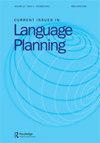教师代理与旅游和酒店英语类CEFR政策的实施:来自印尼当地职业高中的见解
IF 1.8
1区 文学
Q2 EDUCATION & EDUCATIONAL RESEARCH
引用次数: 3
摘要
摘要旅游业是一个服务行业,需要训练有素、具备国际认可技能(包括英语水平)的专业人员。满足这些要求一直是东盟旅游部和教育部最关心的问题之一。印度尼西亚教育部和旅游部与东盟成员国和澳大利亚政府合作,试点整合了欧洲共同语言参考框架、东盟旅游专业人员共同能力标准、东盟共同旅游课程、,地区资格框架和技能认可系统(RQFSRS)以及印度尼西亚资格框架(IQF)纳入酒店和旅游教育的国家课程(K-13)。该项目在酒店和旅游学院进行了成功的尝试,随后扩展到职业高中。本文报道的这项研究调查了英语教师如何在印尼当地的职业高中实施各种政策,以及这一过程产生了什么结果和经验。文章阐述了微观层面的教师机构在满足地区、国家和地方政策要求方面的作用,为旅游和酒店专业人员进入东盟共同就业市场做好准备。本文章由计算机程序翻译,如有差异,请以英文原文为准。
Teacher agency and the implementation of CEFR-like policies for English for tourism and hospitality: insights from local vocational high schools in Indonesia
ABSTRACT Tourism is a service industry that demands well-trained professionals with internationally accredited skills including English language proficiency. Meeting such demands has been one of the foremost concerns of the ASEAN ministries of tourism and education. In collaboration with ASEAN member countries and the Australian government, Indonesian Ministry of Education and Ministry of Tourism piloted the integration of the Common European Framework of Reference for Languages (CEFR), ASEAN Common Competency Standards for Tourism Professionals (ACCSTP), Common ASEAN Tourism Curriculum (CATC), Regional Qualifications Framework and Skills Recognition System (RQFSRS), and Indonesian Qualification Framework (IQF) into the National Curriculum (K-13) for hospitality and tourism education. Successfully trying out at hospitality and tourism colleges, the project was subsequently extended to vocational high schools. The study reported in this article investigated how the various policies were integrated by English teachers for their implementation in vocational high schools in a local Indonesian context and what outcomes and experiences resulted from this process. The article illustrates micro-level teacher agency in meeting regional, national and local policy mandates for preparing tourism and hospitality professionals for the common ASEAN job market.
求助全文
通过发布文献求助,成功后即可免费获取论文全文。
去求助
来源期刊

Current Issues in Language Planning
Multiple-
CiteScore
4.80
自引率
16.70%
发文量
26
期刊介绍:
The journal Current Issues in Language Planning provides major summative and thematic review studies spanning and focusing the disparate language policy and language planning literature related to: 1) polities and language planning and 2) issues in language planning. The journal publishes four issues per year, two on each subject area. The polity issues describe language policy and planning in various countries/regions/areas around the world, while the issues numbers are thematically based. The Current Issues in Language Planning does not normally accept individual studies falling outside this polity and thematic approach. Polity studies and thematic issues" papers in this journal may be self-nominated or invited contributions from acknowledged experts in the field.
 求助内容:
求助内容: 应助结果提醒方式:
应助结果提醒方式:


